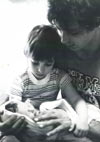 Take Our Kids To Work Day
Take Our Kids To Work Day
Chris Miller
Today is Take Our Kids To Work Day. A government-funded not-for-profit consortium called The Learning Partnership organized it to forge community alliances and strengthen public education.
My employer, Financial Visions, hasn’t made a profit in the fifteen years I’ve been with the company. We belong to a group of similarly unprofitable companies operating under the umbrella of a large, privately held home heating oil conglomerate inexorably tied to their various products and services. In our case, our very bad software. Plus we’re a tax write-off.
My son stopped by the office this morning on his way to community college where he’s enrolled in a machinist program. Ever since he quit his job as a machinist to pursue these studies, he’s been strapped for cash. So I see him every week. He was unaware that today was special.
Ellen from customer support and her son phoned in sick. They are spending the day at the zoo.
Shamus, who nobody knows what he does, dropped his girlfriend’s two teenage boys off and left. They’re sitting in his cubicle. Nobody knows where he went or when he’s coming back.
So Doris, our general manager, is the only one here properly participating. She brought her daughter, who, from her complexion and demeanor, I guess to be thirteen. And also from the novel she’s reading. There’s a vulnerability to her complexion that strikes me as the precursor to acne; I feel for her. Her demeanor is fashionably sullen, in keeping with the garish invisibility of adolescence. “So what are you reading?” I ask.
She doesn’t acknowledge that I’ve spoken, except to tilt her novel upwards. Ennui makes her homelier than necessary. It’s a YA fantasy that’s beneath what I suspect’s her level.
Doris keeps a small, framed family portrait on her desk. The husband is homely in a different way than the daughter. Whereas the daughter’s face is long and horsy, his appears squashed, or perhaps contracted, like a section in the middle might be missing. He could probably pull his lower lip up over his nose if he wanted. Doris is good-looking though. Fourteen years ago at an Interac Members convention in Toronto, we had an affair. Although perhaps affair is not the right word. It implies an intimacy of sorts. We just had sex.
I don’t want the daughter to feel alone, so I tell my son about “Take Our Kids To Work Day.” “Pretend that’s why you’ve come,” I say. “Pretend you are here to see what it’s like to have a real career.” He accepts his allowance and agrees.
Together we walk over to Doris’s little storeroom-cum-office where I introduce him to the daughter who’s playing some cheap plastic handheld videogame that also looks beneath her contemplation. “Like you,” I say, “my son is here to discover what it means to be a productive member of society.” She glances up. My son smiles. I recognize in them a similarity of expression, a drawn hopelessness around the cheeks and eyes, the same crowded occlusion. I notice she wears braces. My son declined to get them after years of listening to me refer to my bout with orthodontics as a long, tedious, at times painful, commitment of dubious benefit. I wonder now if this isn’t somehow related to his unwillingness to suffer the conformity of a job. Or a relationship. “How’s it going,” he says to the girl. Then she ignores him too.
After my son leaves for machinist school, I drop by Doris’s office again, to explain why no change is required to some software she’s been complaining about. Her daughter’s standing over a filing cabinet, stuffing ATM key-parts forms into thick orange folders.
“Watch out for paper cuts,” I say.
“He’s talking to you,” says Doris.
“Do you miss school?” I ask.
“That question was for you,” says Doris.
“This is the light at the end of the tunnel,” I say. “It doesn’t get much brighter.”
Doris stands to look over her daughter’s shoulder, ostensibly to see that she is filing the forms correctly. Even slouching, the daughter is taller. So I assume the husband with the hamburger-shaped head must be crouching or kneeling in the portrait. “Do you have a better idea of what you don’t want to be when you grow up now?” I ask. She looks up at me and seems almost to speak. There is an uneasy familiarity between us that borders on contempt.
The owner of the company, who can never resist any sort of meeting, stops on his way to quashing a deal somewhere. There isn’t room for four people in Doris’s office, especially when one is a brooding adolescent. “What have we learned?” he asks from the doorway. He too is posturing for the kid.
“We might have to change how we stand in for active pre-auths,” says Doris.
“That office romances never work out,” I add.
The owner guffaws and leaves. It is as if I have said sibling romances never work out. Even in the most dysfunctional of families. Doris turns pink and glares at me. I have crossed some line here.
Suddenly the garish invisibility of the past no longer suits me. My wife and I have made love a thousand times. Yet I cannot recall a single instance with clarity. Doris and I did once. And though there’s ample pressure to forget, I remember every detail, every nuance.
It happened in Toronto’s downtown Chelsea Hotel. After a long day of exchanging business cards with glad-handing marketing types between sermonic presentations. In her tenth floor room. Indistinguishable from my seventh floor room save for the number on the door, the watercolor print over the bed, the water stains on the carpet by the bathroom, and its browner ceiling. A smoking room, stuffier and tawdrier than mine.
The daughter cocks her head. She too has picked up on her mother’s reaction to my office romance crack.
“You can go now,” says Doris.
“So my work here’s finished?” I reply in exactly the same tone as fourteen years ago.
After an expensed dinner consisting of uric venison bouillon, bloody chateaubriand with white asparagus spears, crème caramel and a carafe of ’89 Pomerol Cabernet Franc, Doris invited me up to “compare notes.” Then stripped while I was in the washroom. “Surprised?” she said when I returned.
A vagina is a miraculous thing. I’d witnessed its power ten years prior, at my son’s birth. In his expulsion from the cave. It is a creative force—a god that cannot be denied: what it offers must be accepted; what it wants must be given.
So it was as if two entities occupied her freshly turned down bed: one, Doris lying with her knees back in a V; and the other, a vagina. I could not reconcile them. There seemed no connection, no relationship between this pretty, young colleague, from whom I’d never sensed the tiniest salacious spark, and her mesmerizing vagina with its sanguine depths, mystical folds and fine disarray of pubic hair. I realized that in some distant, shadowy life there would be remorse, discomfiture and guilt. That the future would change. That nothing could be the same again. But, even before she turned her head to bury her face in a feather pillow, I knew none of this mattered.
According to a retired US army friend, Pennsylvania’s Old Order communities sometimes recruit the services of the Carlisle Barracks and Letterkenny Depot soldiers. The Lancaster Amish are notorious for their puppy mills and insularity. They’ve learned a thing or two about inbreeding over the centuries. According to my friend, who though claims not to know firsthand, they fashion a tent, obscuring the mother-to-be from the waist up. Foreplay is not encouraged. When Doris arched her back and drew three fingers across her vagina, I knew it would brook no discussion or dissent. No delay either. I remember my climax as delicious weeping, and hers as silent, angry shudders.
“Who is he?” whispers the daughter.
“He’s our systems programmer,” says Doris.
“Who are you?” asks the daughter, looking at her feet.
I think of the Amish defending their segregation by quoting II Corinthians 6:14: “Be not yoked with unbelievers. For what do righteousness and wickedness have in common? Or what fellowship can light have with darkness?" And how their ideology is now as stagnant as their gene pool. I think of star wars.
Dare I lead her from the garden? She is waiting.
“I’m nothing,” I finally answer in disservice. “I’m no one,” I equivocate.
“Thank you,” says Doris by way of dismissal. Then again, silently, only mouthing the words: “Thank you.”
The daughter stares at me. Studies me, without malice or agenda, like I am a chirping electronic gizmo, or a book of limited scope and vocabulary. She steps closer. I am transfixed. In her pupils I see my reflection, and that my sweater is on both inside out and backwards. She moves closer still. For a moment I wonder if she’ll hug me. Then, in my eyes I see her eyes. And in hers, mine again. And again, and again. She sees too. This long dark hall of mirrors. This tunnel of lies. This silence. This future.
© Chris Miller 2008
This story may not be archived, reproduced or distributed further without the author's express permission. Please see our conditions of use.
The Barcelona Review is a registered non-profit organization
 Chris Miller was born Halloween, 1952, in Basel, Switzerland, grew up in Chicago, and moved to Ontario in 1969. His General Arts degree from the University of Waterloo contains no Lit credits, although he did take Business Writing and Communications as part of a college Computer Programmer/Analyst diploma. He has two grown sons by his first marriage, and lives with his second wife in whose restaurant he washes dishes and ‘cooks.’ He’s worked as a farm slave, factory cookie maker, geriatric orderly, painter (of apartments and townhouses), technical writer, and (now) software developer. He’s written one novel, a collection of essays, and is finishing a second collection of short stories—all for love.
Chris Miller was born Halloween, 1952, in Basel, Switzerland, grew up in Chicago, and moved to Ontario in 1969. His General Arts degree from the University of Waterloo contains no Lit credits, although he did take Business Writing and Communications as part of a college Computer Programmer/Analyst diploma. He has two grown sons by his first marriage, and lives with his second wife in whose restaurant he washes dishes and ‘cooks.’ He’s worked as a farm slave, factory cookie maker, geriatric orderly, painter (of apartments and townhouses), technical writer, and (now) software developer. He’s written one novel, a collection of essays, and is finishing a second collection of short stories—all for love.
Author’s website: http://fairwriting.com